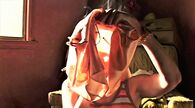It is said that when David made this film, he had the script at his fingertips, so he did not want to express anything, but wanted to express the feeling of being pulled out of the autonomic nerve and falling from reality to a weird subconscious. (zuomeng) It is this resonance from the depths of consciousness that attracts me.
As a child with suspected bipolar schizophrenia, I can secretly tell you some of my terrifying delusions. For example, when climbing stairs, you must follow the adults and keep a distance. I am afraid that she will suddenly be possessed by a ghost and I will be blocked on the roof. At night, watching my mother's pale face illuminated by a small night light, I was always worried that she would die, so I put my hand in front of her nostrils. It's like a child worrying about a monster popping up under the bed. This may be due to childhood insecurity.
However, dreams are not 100% related to reality, and even more illogical and absurd. It took me racking my brains to come up with a far-fetched explanation.
Stepping on the spring, I was chased by the "evil" people in my grandfather's community inexplicably. The roof of my house has an extra layer. The wallpaper is a dizzying circle, and I peek at another world from the top window of the garage. There is always some unreasonable fear and oppression in these nightmares.
The emotionally delicate David Lynch is the catcher of these "true and micro-emotions". He can not only make his consciousness real, but also quite textured. For example, the picture is what the ordinary human eye sees, not every picture in Hollywood is the standard golden ratio. In addition to this, the theme of this film seems to be unique. Other than that I can only think of the old Alice in Wonderland.
However, I still don't understand how resourceful the heroine must be to make such a logical and creative dream of "can't remember the sequence of events"!
The above are purely personal feelings, please be gentle.
Wish me a good dream.
View more about Inland Empire reviews











